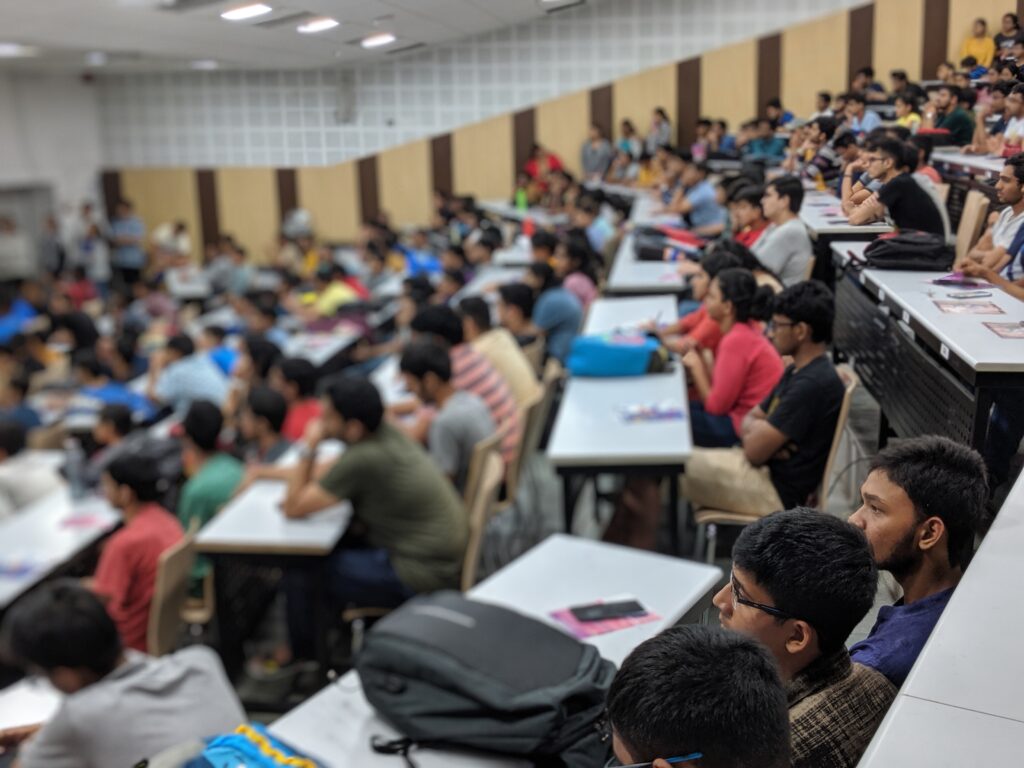A Proposal for Universal Late Days

The current system of deadlines is certainly far from perfect and students frequently complain about the deadline system due to multiple reasons. A recent discussion on the Facebook group Life@IIITH has brought out some solutions proposed by the students to these recurring issues.
Issues with the current system (students)
The current system requires all the students to submit on a common deadline which is set by the instructor of the course. Students sometimes have multiple deadlines for different courses at the same time and the same day, making it practically impossible to complete all of them satisfactorily. Hence, they have no options but to ask for deadline extensions. These extensions, if granted, cause the workload to be shifted to later, which may clash with another deadline, making students ask for an extension for other courses. This, in turn, causes a wave of deadline extension requests.
The number of students who need an extension for the assignment might be less, as everyone has their own pace of working on different subjects. Anecdotally, an extension is generally granted even with 20% of students asking for it. This situation gets worse UG3 onwards when electives are taken by a variety of students usually from different batches, and very few courses have a significant number of students in common. The students’ workload is significantly different and each student has their own subset of deadlines to deal with.
For example, if a student has taken courses X and Y, and there are very few students who have taken both of these courses other than him/her, then it becomes difficult to get either of the deadlines extended as there is little support.
Even with lenient instructors, it is unlikely for all the deadlines in a course to be extended. Thus, students have to decide when they want to ask for extensions. Some students may desperately need an extension for an assignment, but it might not be in the interest of the other students as an extension on a later assignment might be more essential.
Some courses have working professionals taking them and it is extremely difficult for them to manage course deadlines. The presence of arbitrary deadline times is a major issue.
Deadline extensions are often a cause for procrastination for many students who would have otherwise completed the assignment on time. (This happens all the time :p)
Issues with the current system (instructors)
Course instructors, the professor, and the TA’s also have some problems with the system. Since a general structure of deadlines is maintained by the instructor, an extension for one deadline generally hampers the entire structure if no buffer is kept for the assignment. An extension delays the release of the next assignment and hence the instructors have to consider whether to grant the extension. Also, it does become irritating from an instructor’s point of view if there is a call for an extension for every assignment.
Students sometimes fail to submit the assignments on time due to unavoidable circumstances and hence have to mail the professor and ask for extensions or let go of the assignment marks. These individual submissions, if considered, have to be considered and graded individually.
Special challenges faced in the online semester
The online semester has aggravated the issues with the deadline system. Since most courses have a larger number of assignments with more weightage in an online semester, the above-mentioned problems have become more significant.
Many courses have more short quizzes as a replacement for the mid-semester and end-semester examinations, thus creating more workload of studying for quizzes. The clash between assignment deadlines and quizzes are more difficult to deal with. This was not a problem in a usual semester as quizzes, mid-sems, and end-sems would be officially scheduled and would rarely clash. The assignments during this time would also be suspended.
Unexpected issues such as internet connection failures are more frequent at home as compared to that in hostels, where we have the luxury of LAN. Hence, assignment submission failures are also more frequent.
Late Days
What are late days and how they help
‘Late Days’ is a system where a certain number of days are allowed throughout the semester for use for late submission of assignments, projects, etc without any penalties. Say X late days are assigned for a course, then one can use X days or less in total for extending their personal submission deadline throughout the semester.
This system allows the students to plan their work and assignments better so that they can use their late days when they are needed. This can solve a lot of the problems stated above, as individual students can use their late days when the deadlines for several courses clash. It makes students more responsible for managing their deadlines and also provides them flexibility.
Implementation in Other colleges
Universal late day policies are common in several universities worldwide, due to the logistical and mental ease that comes with it. One study of ‘Late Banks’ (a pool of late days) shows that is a highly effective technique for reducing stress levels.
The paper discusses how multiple deadlines and late penalties in college lead to a stressful situation for the students. In the study, two graduate programs integrated a late bank system into their online courses. After each assignment was due, a survey was used to measure students’ levels of stress, the perception of the late bank, and reasons for using it. This study found the late bank was utilized by students, was positively regarded, and improved student attitudes toward their instructor. Reported levels of stress were similar for students who used the late bank compared to those who did not. The results suggest that incorporating a late bank into the course design is an effective method of promoting student well-being.
Previous Implementations in IIIT courses
Late days aren’t new to IIIT by any means, it’s just the universal adoption that is in question. In fact, this system was implemented last year in a couple of CLD courses – Computational Linguistics 1 (CL1) and Computational Linguistics 2 (CL2). CL1 had a system where the students could take up to two late days per assignment from a pool of N late days. Student response seems to be positive, with one student, Mayank Goel, stating that “I found it (the system) really useful as my parents came to town and I needed an extension, but it was a minor personal problem and a uniform extension obviously couldn’t be requested. Using my late days I was able to cleanly and efficiently plan out something which usually requires mails to Prof and I got an extension which I mostly wouldn’t have otherwise “
On the logistical side of things, TAs seem to have a positive impression of the system as well. Saujas VS, a TA for the aforementioned course, felt that it let students prioritize their tasks with minimal effort to implement the system. TAs just have to check the timestamp of a submission to calculate the late days. “It’s important to understand that late days are not an alternate system. They are just a way of giving students some flexibility within the system of hard deadlines. The difference here is that the amount of flexibility (to some extent) is determined by the student, and not only by the course staff. Ideally, it shouldn’t make a big difference to either the staff or the students. It’s just a measure in case of some unforeseen circumstances/coincidental deadline pileups.”, he says. On the flip side, he notes that this requires good planning of the semester, else students could just end up saving late days anticipating a crammed day/week that never comes.
Some courses like Mobile Robotics and Advanced Graphics have also adopted this system for the semester. The complete dynamics of the system in these courses is yet to play out, but students seem to like the freedom that comes with it so far.
Probable Issues and Workarounds
General deadline extensions may also be required, as at times, the deadline falls in a quiz week and students might have to use up all their late days to push it beyond the week. Solutions to this might be –
- If 75% or more people want a deadline extension, then a general extension could be made.
- The students can ask for an extension as soon as the assignment is set so that the deadline is not placed during that time at all.
This solution also does not solve the issue of deadline extensions from the instructor’s point of view as the grading of individual students who use their late days may have to be done separately later. However, this should not be a major issue as the grading generally takes at least 4-5 days. Also, the system is useful only if one has an overview of the number, date, and difficulty of the assignments which can come later. With insufficient information, one can keep piling up late days or use them all for some difficult assignment at the beginning of the semester.
While the particulars of the date of submission cause much strife, the time of submission becomes a nuisance in many instances as well. Hence, it’s worth looking into a universal policy for the time of submission as well, which brings us to…
Universal Deadline Time
As brought out in a Life@IIIT Facebook post. Deadlines at IIIT are generally kept at times fixed by the instructors. On deadline days, the batch groups are filled with reminders as to when the deadline is. While some have a constant time at 11:55 pm, others have varying times throughout the day. The varying deadlines cause the students to have to remember not only the date but also the time of these deadlines. This becomes difficult with a large number of deadlines and students tend to miss out on deadlines. A possible solution to this is to keep all deadlines by the college at 11:55 pm, the UDT.
Conclusion
These are a possible solution to the issues faced by a lot of people but probably not perfect ones. However, they should be explored since they have been successful when implemented before. The reforms suggested do not need to be introduced by the professor themselves. The TA’s can suggest these to the professor and get it implemented for the benefit of both, the students and the instructors.
I am thankful to Shivaan Sehgal, Mayank Goel, Saujas VS, Vishal Verma, and everyone whom I asked for their opinions in the matter for their valuable input. Thanks, Jaidev for helping me out in structuring and planning the article and for the much-needed reminders!

 We Are So Cooked
We Are So Cooked  Qu’ils mangent de la grenouille! (Let Them Eat Frogs!)
Qu’ils mangent de la grenouille! (Let Them Eat Frogs!)  Tale of Two Cheenties
Tale of Two Cheenties  Peace of mind.
Peace of mind.  Boats and Valorant
Boats and Valorant  Blessings
Blessings  A perspective on sports in IIIT
A perspective on sports in IIIT  Paintings of IIIT
Paintings of IIIT  The Tale of Jagruti
The Tale of Jagruti  Cleaning up the Mess?
Cleaning up the Mess?
1 thought on “A Proposal for Universal Late Days”
Comments are closed.